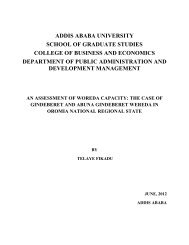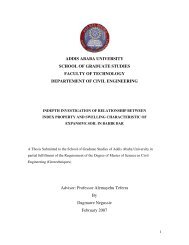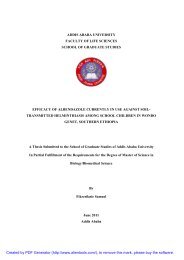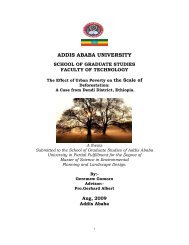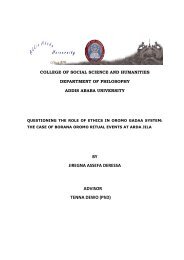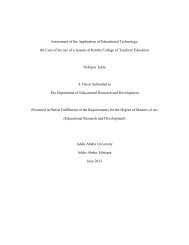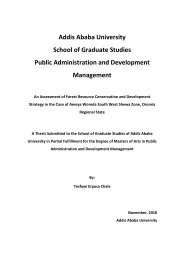FACTORS THAT CONTRIBUTE TO THE PROBLEMS EFL ...
FACTORS THAT CONTRIBUTE TO THE PROBLEMS EFL ...
FACTORS THAT CONTRIBUTE TO THE PROBLEMS EFL ...
Create successful ePaper yourself
Turn your PDF publications into a flip-book with our unique Google optimized e-Paper software.
4.6.2.2 Achievement scores in ‘Communicative English Skills’ (FLEE 101e)<br />
According to the syllabus published by the Ministry of Education of Ethiopia<br />
(MOE, 1994), by the end of grade 12, the students gain sufficient mastery of the<br />
skills of listening, speaking, reading and writing in English which enable them to<br />
study effectively at school, and to use the language whenever necessary in<br />
everyday situations and in the world of work. Therefore, when the students join<br />
Colleges and Universities, there is an assumption that the students have the<br />
necessary prerequisite skills of listening, speaking, reading and writing in English<br />
that enable them to study effectively at the tertiary levels.<br />
When we come to the particular intent of the point, the participants of this<br />
study have taken English Courses, such as, Communicative English Skills,<br />
Reading Skills, Methods of Teaching English, and Practicum-I including the target<br />
listening course. The researcher has tried to see the students’ results which were<br />
recorded to determine the students’ grades particularly of Communicative English<br />
Skills in which listening is one of the components of the course. The results in this<br />
course were not as low as that of the listening course (with the exception of the<br />
results of some students); however, the students' results in most of the<br />
assessments (of listening, speaking, reading, and writing) in the Communicative<br />
English Skills were not good enough. This shows the learners achievement in the<br />
over all English skills (listening, speaking, reading, writing) was low. This may<br />
imply that the learners' English is poor. The learners’ poor English can be one<br />
factor which affected the students listening comprehension.<br />
Effective comprehension in foreign language requires the knowledge of<br />
grammar, vocabulary, and the overall skills of the target language (Rost, 1990;<br />
Rubin, 1994). Therefore, listening comprehension may be difficult for these<br />
students whose English is poor. Further more, it is difficult for such students to<br />
apply the various listening strategies whenever they are engaged in <strong>EFL</strong> listening.<br />
The finding presented in Table-2a can be evidence for this case, and this is also in<br />
line with Murphy’s study (1985), which shows that students with poor English<br />
proficiency are not able to employ the appropriate strategies whenever they are<br />
engaged in <strong>EFL</strong> listening activities. Similarly, the study of O’Malley et al (1989)<br />
identified differences in the frequencies and varieties of strategies that more<br />
82




